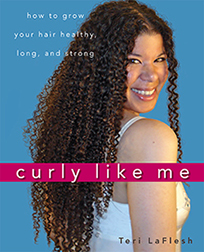
Available now!
Curly Like Me, the off-the-grid, do-it yourself owner's manual for tightly curly hair, is ready for ordering. Grab your copy today!

Every purchase made from
this site (through Amazon)
helps support it — and it
doesn't cost you anything
extra.
|
|
Here are some of the questions I get asked the most, and what my answers have been.
This way you can get your answers immediately, without having to wait on me.
And you never know, you might find answers to a few questions you didn't even know you had yet.
*This is still a work in progress. I'm continuing to add many more questions, and we are still ironing out a few quirks.
But we wanted to make this available as soon as possible.
There are several ways to choose the question(s) you'd like answered:
... or you can ...
... or you can ...
|
|
|
|
|
| |
Question:
Are natural conditioners better?
Answer:
Many conditioners that are marketed as being Natural actually use nearly the same working ingredients as all the other conditioners. They just throw in a few extra exotic sounding plant extracts to charge more money for them (and no matter what it says on the bottle or commercial, nothing can heal hair. You can throw all the herbs and extracts on your hair you want, but they can't repair it. A good conditioner can make hair feel better, but that's not the same as repairing damage).
I'm not saying there aren't some wonderful products out there, because there are, and I have a couple I recommend on the site. I used to use products marketed as natural all the time back in the day, and loved how they smelled. But I found that they often weren't slippery enough to get the comb through my hair. That and I'd nearly have to use the whole bottle to have enough to weigh down my hair (they are often too light for our hair type).
But many charge lots of money for being (ingredients-wise) essentially a drugstore brand with better marketing and some exotic herbs or oils thrown in (often in teeny amounts to boot). Many of the pricey products marketed as natural are nothing more than oils, with a few more exotic sounding oils thrown in to sound good. But oils are oils, and they all work basically the same. In fact, some of the oils shown to strengthen the hair a bit or cheaper oils (like olive oil). Because of this I don't like that many brands marketed as Natural charge huge prices for ingredients that aren't really that special. However, what's important is using products that make you happy--that and that they don't hurt your hair.
I'm not saying natural products are bad, just they're expensive and they don't work for me any better than cheaper drugstore products (and they often use the very same ingredients found in drugstore brands). We're surrounded by chemicals all day, in our makeup, food, and body-care ingredients. I do feel it's important to choose products that don't hurt the environment, so if you buy a product for those reasons, then you are going into it with open eyes. What bothers me is that many of these product lines are spreading misinformation about perfectly fine ingredients used in regular brands to justify their prices, or that they promise to "heal" or "repair" damaged hair, when they can't.
The funny thing is that the ingredients in expensive and/ or conditioners marketed as natural are often the same ingredients that are in less expensive products. It's all about marketing. They throw in a few "gimmick" ingredients like exotic sounding herbs and oils that don't actually do anything for the hair that less exotic sounding oils do (such as olive oil), but sound like they must work because they sound so unusual, or are from so far away.
|
|
|